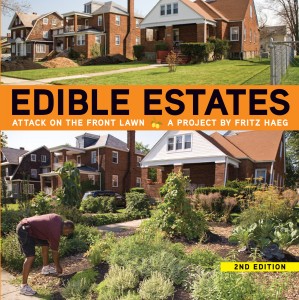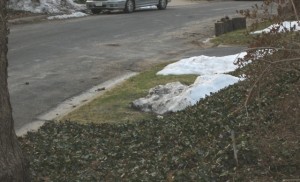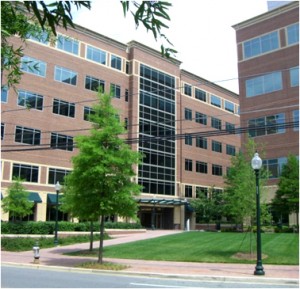“Do they park their cars there,” they asked? “Do they grow food, do they sit there?”
“No, it’s just grass,” he said. “They don’t do anything with it.”
And when our Greek uncle built a little villitsa by the seashore, in true lord of the manor style, he fronted it with a lawn. But he couldn’t let the rectangular grass strip alone and planted shrubs right down the middle, a somewhat confused aesthetic.
In Edible Estates: An Attack on the Front Lawn , Fritz Haeg unpacks the front lawn—why are we mowing instead of growing?
In various essays, landscapers, designers, and gardeners point out that lawns are holdovers from our manorial aspirations, but they make no sense. Lawns take up our time, they require water, pesticides, and cheap gas to maintain, and they could/should be turned over to gardens.
His proposal makes perfect sense, yet we can’t seem to help ourselves.



Bob
Does the book include information on how to keep deer from eating the front yard gardens? We have a deer problem already, and I don’t want to facilitate an even larger deer population by providing more food for them.
claudia
The book is more of a manifesto than one of gardening tips. The most I could find, was–put up a fence–which is not really helpful.
But this is a classic planning problem–where we’re always trying to equitable manage scarce resources–we have to ask which has more value, home vegetable gardens or wildlife?
Bob
In this case it would appear that it isn’t an either/or question. More vegetable gardens in front yards will lead to more deer unless we find a way to limit the deer population.
My point is that grass lawns, which don’t feed deer, aren’t necessarily bad. And front yard vegetable gardens aren’t necessarily good because of their unintended consequence of promoting a larger deer population. Around here, a front yard vegetable garden is more like to feed deer than “feed you and your neighborhood.”
Tina
Planting a vegetable/herb garden wont increase the numbers of deer, but yes, it might feed the ones that are hungry. It’s a hard dilemma but they’ll eat your tulips too. Grass isn’t a good thing. Grass is a monoculture and doesn’t allow the majority of stormwater to infiltrate back into the ground water table. Lawns don’t provide insects, birds, bees, or butterflies with nutritious food or pollen, nor do lawns provide host plants for reproduction.
A residential landscape should connect and blend with the greater ecosystem instead of being a sterile island with no ecological and human value. Yes, perhaps a few deer will browse so a fence would be wise. In the end, eliminating or reducing your lawn would benefit hundreds of species as they try to live and migrate through this wonderful county.
Thayer-D
I think it’s a great idea. It might bring down property values in some people’s eyes, but if anything it would help foster neighborlyness by getting us out doors and away from the idiot boxe(s). You might also get some exercise and eat better! I wonder what all the lead contamination of 100 years of cars driving around has done to the average lawn around here?
Brains from my father
I don’t disagree with what’s been posted, but traditional grassy yards have their place. They accomodate games of catch and soccer, backyard cookouts, and those times when you want to lie down and stare up at the sky. Those of us with small houses and small kids may see the back yard or front yard as an extra room to escape to when things get too cramped inside. Maybe the right balance is to de-lawn the front lawn and keep the back lawn grassy. Or just build smaller houses on smaller lots to begin with.
Ted
My kids and dog are confused by the statements “They don’t do anything with it”, “they make no sense”, “otiose front lawn”, and “sterile island with no … human value”. They love our small front and back lawns, and they use them every (warm) day. They love our small vegetable garden too. Both have value.